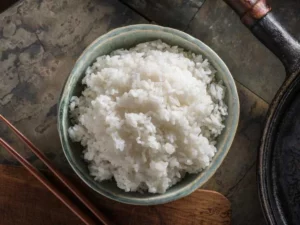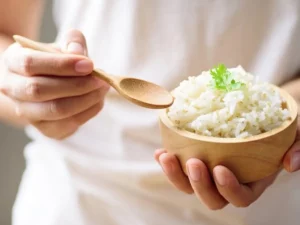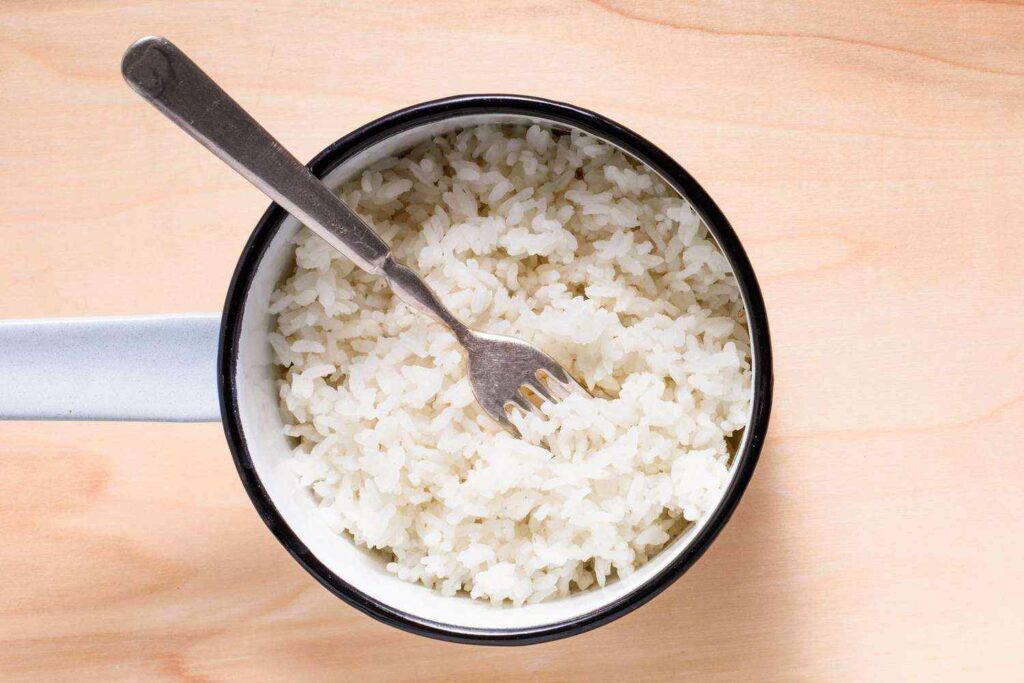Rice has always been a staple food in many cultures around the world. It is inexpensive, filling, and easy to prepare. But what about its effects on weight? Is rice bad for you if you’re trying to lose weight? In this blog post, we will explore the truth about rice and weight – including whether or not it’s a good idea to include it in your diet if you’re trying to put on.
Contents
Understanding Rice
 Rice is a cereal grain and the most widely consumed staple food for a large part of the world’s human population. It is the agricultural commodity with the third-highest worldwide production, after sugarcane and maize. There are many varieties of rice that range in color, flavor, texture, and size. Rice also plays an important role in religious and cultural ceremonies around the world.
Rice is a cereal grain and the most widely consumed staple food for a large part of the world’s human population. It is the agricultural commodity with the third-highest worldwide production, after sugarcane and maize. There are many varieties of rice that range in color, flavor, texture, and size. Rice also plays an important role in religious and cultural ceremonies around the world.
Rice is produced in a variety of ways, such as wet or dry farming methods. Wet-farmed rice is grown in flooded paddies, while dry-farmed rice is sown directly into dry fields. There are several types of rice that are differentiated by their grain size and shape, such as long-grain, medium-grain, and short-grain rice.
When cooked properly, rice is a delicious addition to any meal. To cook it correctly, it is important to use the correct ratio of water to rice and the right cooking time for each type of rice. Different types of rice may require different cooking times and amounts of liquid. So it is a good idea to familiarize yourself with the instructions for each type.
Connection Between Rice And Weight
There is an ongoing debate about the connection between eating rice and weight gain. While some studies suggest that consuming white rice may be linked to increased body weight. And other research has shown that brown rice may have a protective effect against obesity.
The main difference between white and brown rice is their fiber content; white rice is stripped of its bran and germ during processing, which decreases its fiber content significantly. Brown rice contains much higher levels of dietary fiber than white rice, making it a healthier option for people looking to monitor their weight.
Studies have shown that replacing white rice with brown can help reduce body weight and waist circumference. This is because the whole grains present in brown rice can help you feel more full for longer periods of time. Eating foods with a low glycemic index, such as brown rice, can help regulate blood sugar levels. And even reduce the risk of cravings.
In addition to helping people maintain their weight, some research has shown that eating brown rice may also have beneficial effects on heart health. Studies suggest that regularly consuming whole grains, such as brown rice, may lower your risk of stroke and coronary artery disease.
Overall, more research is needed to determine the exact connection between eating rice and weight gain. As it appears that whole-grain options such as brown rice can be beneficial for people looking to maintain a healthy weight.
How Much Rice Should You Eat For Weight Gain?
 Though there is no single answer to this question, as it depends on numerous factors. Such as individual calorie needs and activity levels. So, a safe rule of thumb is that an average adult should consume approximately 3-4 servings of cooked rice per day if looking to gain weight.
Though there is no single answer to this question, as it depends on numerous factors. Such as individual calorie needs and activity levels. So, a safe rule of thumb is that an average adult should consume approximately 3-4 servings of cooked rice per day if looking to gain weight.
It’s important to remember, however, that gaining weight requires more than just eating an increased amount of food. It is also important to include a variety of nutrient-rich foods along with healthy fats and protein sources into your diet in order to gain weight in a healthy manner.
Including regular physical activity in your routine can also help increase muscle mass, which will add to overall weight gain. So, it’s important to remember that eating more rice is not the only factor in gaining weight – it must be combined with other healthy habits.
With the right portion of rice and accompanying healthy habits, you can easily add weight and reach your desired physique. So, don’t forget to include some delicious rice in your meals and start living a healthier life!
What Are Other Benefits Of Rice?
Rice is generally a very nutritious and healthy food, but that’s not all. Along with providing essential nutrients such as carbohydrates, proteins, vitamins, and minerals, rice is also known to be beneficial for some other reasons.
- First off is its ability to help regulate blood sugar levels. This makes it a great choice for those who suffer from diabetes or pre-diabetes. As eating rice can help to keep blood sugar levels stable.
- Rice is also high in fiber, which can help aid in digestion and reduce cholesterol. This makes it a great choice for those trying to maintain a healthy diet.
- Finally, rice can also be used to promote weight loss due to its low-calorie content. Rice can be a great supplement to any diet, as it fills you up without adding too many calories.
Overall, eating rice is incredibly beneficial for your health and well-being. Not only is it packed with essential nutrients, but it also provides additional benefits. Such as regulating blood sugar levels, promoting digestion, and aiding in weight loss.
Are There Any Limitations Of Rice For Weight Gain?
 Yes, there are some limitations to rice for weight gain. Some of these might include:
Yes, there are some limitations to rice for weight gain. Some of these might include:
- Rice is high in carbohydrates and can lead to increased levels of insulin in the body. This can be problematic for those who are already prone to diabetes or other metabolic issues.
- It is low in fiber, which means it can be digested quickly and leave the stomach feeling empty sooner than other types of food. This can lead to overeating and feeling hungry soon again.
- Eating too much rice can cause some people to experience bloating and gas due to the high carbohydrate content.
- High-fat, processed varieties such as fried rice or risotto are not advisable for weight gain because of their high-fat content which can easily add up over time.
- Rice can be a source of empty calories if not consumed in moderation. This means that it may provide extra energy without providing any nutritional value.
At the end of the day, eating too much rice or relying on it as a primary source of nutrition should generally be avoided when trying to gain weight. It is important to find a balance between carbohydrates, proteins, and healthy fats in order to create a balanced diet that will support weight gain.
However, if you are looking to gain weight, it is important to speak with a nutritionist or healthcare professional. In order to design an appropriate eating plan for your specific needs and goals. Doing so will help ensure that you are able to reach your desired outcome in the safest and most effective way.
Is Rice Increase Belly Fat?
Now, if you are considering rice for weight gain, this is something you should take into account. Rice is high in calories and can contribute to weight gain, particularly if it’s consumed in large amounts and on a regular basis. Studies have found that eating more than two servings of white rice per day may increase the risk of belly fat accumulation.
Moreover, some types of rice, like white rice, are low in fiber and can cause rapid spikes in blood sugar levels. This may lead to increased hunger and cravings for unhealthy foods and sugary drinks.
It is important to note that certain types of rice such as brown or wild rice may be healthier choices than white rice due to their higher fiber content. Additionally, it is important to consider portion sizes when consuming rice. Eating large portions of any type of rice can contribute to weight gain.
Overall, rice does not necessarily increase belly fat. But it can be a contributor to overall weight gain. It’s important to practice mindful eating and pay attention to portion sizes when consuming rice. Additionally, it may be beneficial to choose whole grain or brown varieties instead of white rice.
Conclusion
In conclusion, rice and weight are highly correlated. Eating rice regularly can help maintain a healthy body weight and prevent obesity-related health problems. Rice is also a great source of vitamins and minerals. And other essential nutrients that are necessary for overall health.
It is important to remember that a balanced and varied diet is essential for optimal health. Eating rice in moderation as part of a healthy diet can help you maintain a healthy weight. And enjoy the many benefits it provides.
If you’re interested in learning more, seek the expertise of FitMantra! Our experienced nutritionists can be easily accessed with just a few clicks. And will offer personalized support to assist you in achieving your fitness goals. Our online nutrition counseling, and weight gain program has been designed to help you! Don’t forget to download our Fitness App available on Android.
